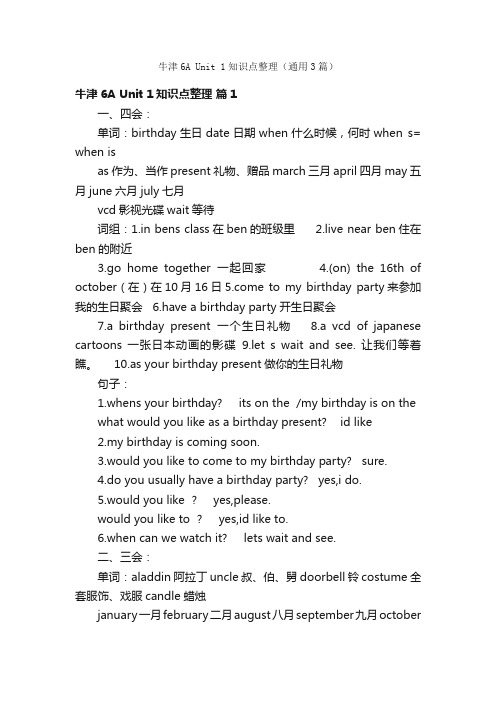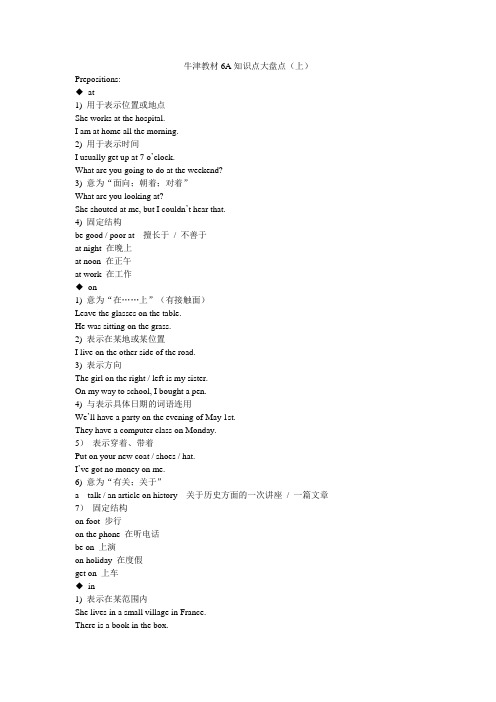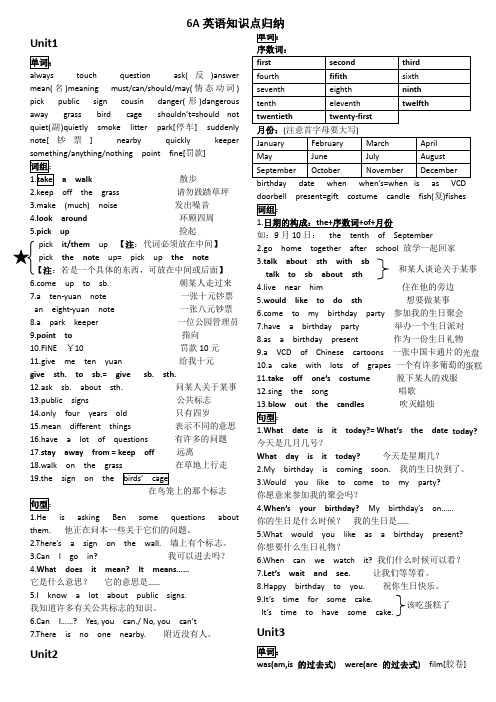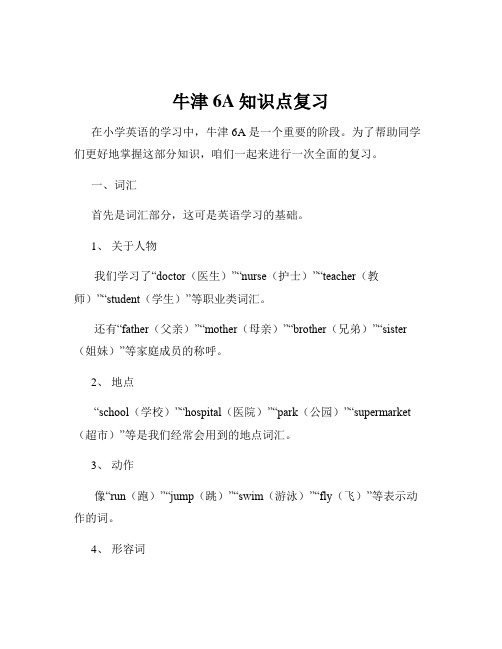[牛津中小学英语网]6A全书知识点整理
牛津6A基础知识汇总

牛津6A基础知识汇总Unit 1单词1:always总是 2:question问题 3:ask问请求要求 4:mean意思是意指 5:must必须应当 6:should应当应该7:shouldn’t=should not不应该 8:pick拾采9:public公共的公众 10:sign标志告示牌子 11:cousin堂(表)兄弟姐妹 12:danger 危险 13:away(离)开 14:grass草地草 15:bird鸟 16:cage笼子 17:quiet安静的 18:noise噪声喧闹声 19:smoke吸烟20:litter乱丢杂物 21:park停放(汽车)22:touch触摸 23:suddenly突然(地) 24:something某事某物 25:note钞票纸币26:around周围在附近 27:nearby附近的 28:quickly快地29:keeper看守人 30:point 指 31:fine罚款短语1. four years old 四岁2. ask Ben some questions 问Ben 一些问题3. go in 进去4. stay away 远离5. keep off 远离6. make noise 发出(喧闹)的声音7. talk about 讨论 8. public signs 公共标志9. No smoking 禁止吸烟 10. No littering 禁止乱扔杂物11. No parking 禁止停车 12. Do not touch 禁止触摸13. Danger! 危险 14. No eating or drinking 禁止吃喝东西15. Keep off the grass 远离草地 16. take a walk 散步17. Be quiet 保持安静 18. be back home from the zoo 从动物园回家19. a ten-yuan note 一张十元纸币 20. say to 对……说21. pick up 拾起 22. come up 上来23. point to 指向 24.look around环顾四周25. fine ¥10 罚款10元 26. birds’cage鸟笼27.walk on the grass 在草地上行走 28.ask sb about sth 问某人关于某事29.no one nearby 附近没有人 30.give me ten yuan=give ten yuan to me 给我十元 31.shake one’s head 摇头句型1:He is asking Ben some questions. 他正在问本一些问题。
牛津6AUnit1知识点整理(通用3篇)

牛津6A Unit 1知识点整理(通用3篇)牛津6A Unit 1知识点整理篇1一、四会:单词:birthday生日date日期when什么时候,何时when s= when isas作为、当作present礼物、赠品march三月april四月may五月june六月july七月vcd影视光碟wait等待词组:1.in bens class在ben的班级里 2.live near ben住在ben的附近3.go home together一起回家4.(on) the 16th of october(在)在10月16日e to my birthday party来参加我的生日聚会6.have a birthday party开生日聚会7.a birthday present一个生日礼物8.a vcd of japanese cartoons 一张日本动画的影碟9.let s wait and see. 让我们等着瞧。
10.as your birthday present做你的生日礼物句子:1.whens your birthday? its on the /my birthday is on thewhat would you like as a birthday present? id like2.my birthday is coming soon.3.would you like to come to my birthday party? sure.4.do you usually have a birthday party? yes,i do.5.would you like ? yes,please.would you like to ? yes,id like to.6.when can we watch it? lets wait and see.二、三会:单词:aladdin阿拉丁uncle叔、伯、舅doorbell铃costume全套服饰、戏服candle蜡烛january一月february二月august八月september九月october十月november十一月december十二月first第一second第二third第三fourth第四fifth第五sixth第六twelfth第十二twentieth第二十twenty-first第二十一词组:1.have a cake with lots of strawberries吃一块草莓蛋糕2.happy birthday to you!祝你生日快乐3.take off脱下take off his costume脱下戏装4.blow out吹灭blow out the candles吹灭蜡烛5.open the door开门句子:1.the doorbell is ringing.2.he is giving ben some cartoons as a birthday present.3.ben is blowing out the candles on the cake.its time for some cake.三、语音:/ / dear hear near year牛津6a unit 2知识点整理来自。
牛津小学英语6A主要语法知识

牛津小学英语6A主要语法知识一般过去时:定义:表示过去某个时间发生的动作或存在的状态,常与表示过去的时间状语连用。
如:yesterday,last night ,three months ago,just now, a moment ago,that night等。
它的肯定形式:I was born in 1995. I watched cartoons last night.它的否定形式:Were you born in 1995? Yes , I was./No, I wasn’t一般疑问形式及肯(否)定回答:Did you watched cartoons last night? Yes, I did./ No ,I didn’t.特殊疑问形式:When were you born? What did you do last night?动词的过去式形式:a:规则动词的过去式词尾变化:1.一般情况下加ed,如watered,planted2.以不发音字母e结尾的加d,如:tasted。
liked,lived3. 以辅音字母+y结尾的变y为i,再加ed,study——studied4.单音节,以一个元音字母和一个结尾的,双写这个辅音,再加ed,如:stop-stoppedb:规则动词的词尾读音:a)在浊辅音和元音后读/d/,如:pulled ,wateredb)在清辅音后读/t/,如cooked , milked ,asked , picked, walkedc)在/t/和/d/音后读/id/,如:collected , tasted , pointed , studiedc:不规则动词的变化没有什么规律,需要大家背熟记牢:is/am –was are-were do-did have/has-had go-wentmake-made sit-sat get-got see-saw come-cameswim-swam put-put eat-ate drink-drank fly-flewbuy-bought run-ran drive-drove know-knew meet-metcatch-caught ride-rode sing-sang speak-spoke say-saidteach-taught take-took think-thought write-wrote give-gave begin-began tell-told hear-heard keep-kept draw-drew代词分为两种:人称代词和物主代词。
牛津6A学习知识点情况总结

牛津英语6A 知识点总结一.名词☆可数名词:可数名词变复数的规则变化不规则变化☆不可数名词:a.b.c.d.e.g.注意:fish 鱼肉(不可数)fish 鱼(可数,单复同形)crab 蟹肉(不可数)crab 螃蟹(可数)☆量词:☆只能接_____________________:a few 几个few 几乎没有many 许多too many 太多☆只能接______________________:a little 一点little 几乎没有much 许多too much 太多too little 太少☆既可以____________________________________:some 许多any 许多plenty of = a lot of=lots of 大量的enough 足够的☆分类:1.___________________________: chicken steak sauages meat2.___________________________: fish crab prawns squid3.___________________________: ice-cream fish balls4.___________________________: milk eggs5.___________________________: chocolate crisps sweets6.___________________________: cakes biscuits bread small cakes7.___________________________: 7-up fruit juice coffee lemonade Coke8.___________________________: carrots onions tomotoes cabbages lettucespotatoes9.___________________________: peaches pineapples oranges pears bananas apples10.___________________________: rice noodles二.冠词☆不定冠词:带有a/an 的词组:a lot of 许多,大量a few 几个a little 一点have a rest 休息have a break 休息have a good time 过得愉快half an hour 半小时☆定冠词:the +形容词的最高级the tallestthe +序数词the second带有the 的词组:play +the +乐器演奏某种乐器in the morning/afternonn/evening 在早上/下午/晚上the same 相同的at the weekend 在周末all the rest 剩下的全部lay the table 摆好餐具on the left 在左边on the left of 在……右边on the right 在右边on the right of 在……左边go to the cinema 去看电影the USA 美国☆零冠词1.月份,星期,季节前2.三餐前3.play+球类4.by +交通工具5. 零冠词的词组:go to school 去上学at school 在学校at home 在家at noon 在中午at night 在下午on weekends 在周末best of all 所有当中最好的go skating 去溜冰go shopping 去购物三.数词☆基数词:表示数量☆序数词:表示顺序在第十层on the tenth floor☆百,千,百万百:hundreds of 数以百计的one hundred 一百two hundred 二百千:thousands of 数以千计的one thousand 一千two thousand 两千百万:millions of 数以百万的one million 一百万two million 两百万☆单位millimetre/er 毫米缩写:_______centimetre/er 厘米缩写:_______metre/er 米缩写:_______ kilogramme 千克缩写:_______ second 秒minute 分hour 小时四.代词☆人称代词:☆指示代词:五.形容词☆形容词的比较级和最高级变化:a). +er +estb). 以e结尾+r +stc). 重度闭音节结尾的,双写+er +estd). 辅音+y结尾的,y改成i+er i+este). 多音节词:more +多音节词most+多音节词特殊变化: good/well------______________------_________________much/many-----_______________-----________________bad------_____________________-----_________________☆句型结构:A 比B 更……A +be+比较级+than +BA最……A +be+the +最高级☆同义句转换:1.Danny is lighter than Peter.2.I am 150 cm. My brother is 180 cm.☆形容词的排序:限数描大形,新色国材名一张灰色的大圆桌_________________________________________________________六.副词☆频度副词:注意:位置:用于__________________时态☆方式副词:用来修饰动词或者动词词组在形容词后面加ly, 以辅+y 结尾,把y变i,再加ly1.loud---____________________2.quiet----_____________________3.slow---_____________________4.quick---_____________________5.happy---____________________七.介词☆表示时间的介词☆in+年,月,季节在一月份in Januaryon+具体的某一天(包括某一天的早上,下午或晚上)在周日on Sunday morning 在周日的晚上on Sunday evening at+时刻在一点十五at a quarter past five☆表示位置的介词1.live in (大地点) Ben and Kitty live in a housing estate.live on +楼层They live on the ninth floor.live at +具体的地点He lives at Flat 18B.2.arrive at(小地点)I'll arrive at Wanda Cinema at nine o'clock.arrive in(大地点)My father will arrive in Beijing tomorrow.3.on+岛屿on Hongkong Island4.in front of in the front of5.next to beside near6.There is a bird_______ the tree.There is an apple________ the tree.☆常用的介词短语1.what about=how about ……怎么样2.Write about 写关于……3.talk about 谈论4. tell sb. about sth. 告诉某人关于某事B. After系列1.look after 照顾2.After school 放学后3.run after 追赶C. For 系列1.be good for 对……有益2.be bad for 对……有害3.look for 寻找4.wait for 等待……5.cook food for people 给人们做饭6shop for food 去买食物7.get ready for…为…做准备8.It's time for +名词到……时间了D. From 系列come from=be from 来自于……E. Like 系列1look like 看起来像……2just like 就像……3.What's the weather like today? 今天天气怎么样?1play with sb. 和某人一起玩play with sth. 玩某物2.share sth with sb. 和某人分享某物3.be crowded with 挤满了…4make…with 用…来做G. Up 系列1.make up 化妆2.dress up 打扮3.grow up 生长H. To 系列1.sell things to people 卖东西给人们2. bring food to people 把东西带给人们3.bring sth to sb.4give sth to sb.5.show sth to sb6.want to do sth.7.need to do sth.8.one’s jurney to 某人去…的旅行9.a visit to…一次去、、、的旅行10fly to…= go to…by aeroplane 乘坐飞机去….I. of 系列1start of visit 参观开始2 end of visit 参观结束3.different kinds of food 不同种类的食物4.a list of foof 食品消费清单5. east of ……的东部6.the first day of Chinese New YearJ. On 系列1.go on a river trip 水上之旅2.go on a picnic 去野餐3.put on 穿上4.get on 上车5.stick…on…把、、、粘到、、、上6.on the pavement 在人行横道上7.on the zebra crossing 在斑马线上8on weekends 在周末9on one's way to 在某人去……的路上10on foot 步行11on the right 在右边☆介词短语后置介词短语后置,起到形容词的作用,来修饰前面的名词The children on page3 of this book are healthy.在书上第三页的孩子们很健康。
牛津英语6a知识点梳理

牛津教材6A知识点大盘点(上)Prepositions:◆at1) 用于表示位置或地点She works at the hospital.I am at home all the morning.2) 用于表示时间I usually get up at 7 o’clock.What are you going to do at the weekend?3) 意为“面向;朝着;对着”What are you looking at?She shouted at me, but I couldn’t hear that.4) 固定结构be good / poor at 擅长于/ 不善于at night 在晚上at noon 在正午at work 在工作◆on1) 意为“在……上”(有接触面)Leave the glasses on the table.He was sitting on the grass.2) 表示在某地或某位置I live on the other side of the road.3) 表示方向The girl on the right / left is my sister.On my way to school, I bought a pen.4) 与表示具体日期的词语连用We’ll have a party on the evening of May 1st.They have a computer class on Monday.5)表示穿着、带着Put on your new coat / shoes / hat.I’ve got no money on me.6) 意为“有关;关于”a talk / an article on history 关于历史方面的一次讲座/ 一篇文章7)固定结构on foot 步行on the phone 在听电话be on 上演on holiday 在度假get on 上车◆in1) 表示在某范围内She lives in a small village in France.There is a book in the box.2) 表示在某段时间内It happened in the past.My birthday is in August.3) 表示在某段时间后She will visit there in three weeks.I’ll come back in ten minutes.4) 固定结构be in = be at home 在家in spring / summer / autumn / winter 在春天/ 夏天/ 秋天/ 冬天in time 及时in hospital (生病)住院◆above 在……上方(没有接触面)The people in the flat above mine made a lot of noise.◆below 在……下方(没有接触面)Please do not write below this line.The temperature fell below freezing during the night.Adverbs:◆副词的分类1) 频度副词: always, often, usually, sometimes, seldom, hardly, never2) 地点副词: here, there, everywhere, anywhere, inside, outside3) 程度副词: much, little, very, rather, so, too, still, quite, enough, almost, slightly4) 疑问副词: how, when, where, why5) 表示先后顺序的副词:first / next / then / after that / finally; firstly / secondly / next / then / after that / finally◆副词的位置1) 多数副词都可以放在动词的后面;但如果动词带有宾语,副词就需放在宾语后面。
牛津版小学英语6A知识点归纳总复习

Unit1always touch question ask(反)answer mean(名)meaning must/can/should/may(情态动词) pick public sign cousin danger(形)dangerous away grass bird cage shouldn ’t=should not quiet(副)quietly smoke litter park[停车] suddenly note[钞票] nearby quickly keeper point fine[罚款]a walk 散步2.keep off the grass 请勿践踏草坪3.make (much) noise 发出噪音4.look around 环顾四周5.pick up 捡起pick it/them up 【注:代词必须放在中间】 pick the note up= pick up the note 注:若是一个具体的东西,可放在中间或后面】 e up to sb. 朝某人走过来 7.a ten-yuan note 一张十元钞票 an eight-yuan note 一张八元钞票 8.a park keeper 一位公园管理员 9.point to 指向10.FINE ¥10 罚款10元 11.give me ten yuan 给我十元 give sth. to sb.= give sb. sth.12.ask sb. about sth. 问某人关于某事 13.public signs 公共标志 14.only four years old 只有四岁15.mean different things 表示不同的意思 16.have a lot of questions 有许多的问题 17.stay away from = keep off 远离18.walk on the 在草地上行走 19.the sign on the在鸟笼上的那个标志1.He is asking Ben some questions about them. 他正在问本一些关于它们的问题。
牛津小学英语6A单元知识点汇总

牛津小学英语6A 1-2单元知识点复习Unit 1一、四会单词always 总是 question 问题 ask 问 mean 意思是 must应当,必须 should应当,应该 take a walk 散步pick拾二、短语1. ask questions问问题2. his cousin 他的表弟(妹)3. park your car here把你的车停这儿4. four years old 四岁5. four years 四年6. an interesting sign一个有趣的标志7. know a lot 知道许多 8. a lot of questions 许多问题9. on the Internet在因特网上 10. look at the photo看这张照片11. learn more 学到更多 12. climb the tree 爬树13. fine ten yuan 罚款十元 14. a park keeper 一名公园管理员15. an old woman in the green sweater 一位穿着绿毛衣的老妇16.public signs 公共标志 17. different things 不同的事物18. some questions about them 关于他们的一些问题19. the sign on the wall 在墙上的标志 20. different things 不同的事物21. stay away from the building 远离那幢大楼22. keep off the grass 不接近草地 23. be/keep quiet 保持安静24. the sign on the bids' cage 鸟笼上的标志25. make noise 发出喧闹声 26. no smoking 禁止吸烟27. no littering 禁止乱丢杂务 28. no parking 禁止停车29. do not touch 不要触摸 30. no eating or drinking 不要吃喝31. take a walk 散步 32. a ten-yuan note 一张十元纸币33. look around 环顾34. pick it/them up 把它/它们捡起35. pick up a ten-yuan note 捡起一张十元纸币36. point to 指向 37. over there 在那边38. give it to me 把它给我 39. shake one's head 摇头40. want some bread for breakfast 想吃一些面包作为早饭41. come up to him 向他走上来 42. eat an ice cream 吃冰激凌43. in the glass 在杯子里三、知识点1. 情态动词情态动词有:can,must(必须),should(应当),would,may(可以),will(将要),shall.2.使用方式:情态动词+行为动词原形(不受时态,人称的影响)肯定句:He can speak English. They should go home now.否定句: He can't speak English. They shouldn't go home now. 一般疑问句: Can he speak English Should they go home now 特殊疑问句:where can we go What should we do注:be动词,助动词,情态动词为三种结构词.每个句子都会有其中一种,若要对句子进行否定与疑问的改动时,只要寻找这三类词.3) 比较: 情态+动词原形 (I can swim)like+ 动词ing (I like swimming)would like/want + to + 动词原形 ( I would like to swim) 2. What does it mean?It means ….What do they mean ?They mean ….3. different +名词复数= different thingsthe same thing(s) (same前面必须有the)4. no+ doing = No smokingnot + do = You should not smoke.5. a lot of与a lot用法的区别a lot of一般用来修饰名词;a lot一般用来修饰动词例如:a lot of things learn a lot6. some, something用于肯定句;any,anything用于否定句和一般疑问句.例:There is some water in the glass. I can see something.(肯定句)There isn't any water in the glass.. I can't see anything.(否定句)Is there any water in the glass Can you see anything (一般疑问句)特例:Would you like some orange juice(表示邀请,征求别人意见,并希望得到肯定回答)Unit 2一、四会单词Birthday 生日 date日期 when 什么时候 second 第二March 三月 third 第三 April四月 fourth 第四May 五月 June 六月二、短语1. a new student in Ben’s class本班上的一位新学生2. go home together一起回家3. after school放学以后4. talk about谈论有关……5. come soon 快到了6. the third of March 三月三日7. open the door 开门8. on the twenty-second of July 在七月二十二日9. on the 18th of October 在十月十八日10. take off脱下11. your birthday你的生日 12. blow out吹灭13. Let’s wait and see让我们等一下看看14. blow out the candles吹灭蜡烛 15.in the bay 在海湾16. as a birthday present作为生日礼物17. birthday cake生日蛋糕 18. a piece of paper一张纸19. come to my birthday party 来参加我的生日聚会20. have a birthday party举办生日聚会21. a VCD of Japanese cartoons 一张日本卡通光盘22. make a birthday card 做一张生日贺卡23. fold it in half把它对折三、知识点1.在一月: in January (在某月要用介词in)在7月12号: on the twelfth of July(在某日要用介词on)在星期三: on Monday2.熟记基数词变序数词的口诀。
牛津6A知识点复习

牛津6A知识点复习在小学英语的学习中,牛津 6A 是一个重要的阶段。
为了帮助同学们更好地掌握这部分知识,咱们一起来进行一次全面的复习。
一、词汇首先是词汇部分,这可是英语学习的基础。
1、关于人物我们学习了“doctor(医生)”“nurse(护士)”“teacher(教师)”“student(学生)”等职业类词汇。
还有“father(父亲)”“mother(母亲)”“brother(兄弟)”“sister (姐妹)”等家庭成员的称呼。
2、地点“school(学校)”“hospital(医院)”“park(公园)”“supermarket (超市)”等是我们经常会用到的地点词汇。
3、动作像“run(跑)”“jump(跳)”“swim(游泳)”“fly(飞)”等表示动作的词。
4、形容词“big(大的)”“small(小的)”“tall(高的)”“short(矮的)”“fat (胖的)”“thin(瘦的)”等形容词可以用来描述事物的特征。
要记住这些词汇,不能死记硬背,可以通过图片、句子或者实际场景来帮助记忆。
二、语法语法是英语学习中的重点和难点。
1、一般现在时这是我们经常会用到的时态,表示经常发生的动作或存在的状态。
比如:“I go to school every day(我每天去上学。
)” 主语是第三人称单数时,动词要发生变化,像“He likes playing football(他喜欢踢足球。
)”中的“like”就要变成“likes”。
2、现在进行时表示正在进行的动作,结构是“be +动词的现在分词”。
例如:“I am reading a book now(我现在正在读书。
)”3、一般过去时用来描述过去发生的事情,动词要用过去式。
像“I went to Beijing last year(我去年去了北京。
)”4、名词的单复数一般情况下,直接在名词后面加“s”,比如“book books”。
但有些名词的复数形式是不规则的,比如“man men”“woman women”“child children”。
- 1、下载文档前请自行甄别文档内容的完整性,平台不提供额外的编辑、内容补充、找答案等附加服务。
- 2、"仅部分预览"的文档,不可在线预览部分如存在完整性等问题,可反馈申请退款(可完整预览的文档不适用该条件!)。
- 3、如文档侵犯您的权益,请联系客服反馈,我们会尽快为您处理(人工客服工作时间:9:00-18:30)。
Unit 1一、there be句型在....地方存在(有)....东西(人)例:There is a computer in the classroom.造句:______________________________________二、visit拜访,看望 visit sb visit 某地,比如博物馆等一些比较有价值的地方例:I visited the Palace Museum yesterday.造句:______________________________________三、make sth for sb为某人制作某物例:make new clothes for me造句:__________________________________四、show sb sth向某人展示某物还有一种形式:show sth to sb例:show me your new schoolbagshow your new schoolbag to me造句:____________________________________五、try on试穿... try on sth例:try on your new clothes,try it on注意it的位置造句:_____________________________________六:a lot of很多,在修饰可数名词时,和many一样例:a lot of cats,many cats造句:_____________________________________七、What beautiful clothes!感叹句格式:what + a/an + 形容词 + 名词,这里的a/an看情况,如果是复数和不可数,就不要用例:What a beautiful house!八、语法部分----一般过去时讲述过去发生的事情过去时需要有变形----动词要用过去式,比如:laughed,looked,pointed...不是所有的动词只要 + ed就行,be动词和其他一部分需要有特殊变化例:am→was is→was are→werelike→liked do→did其他一切都照常,该改问句就改,该否定就否定注意:否定句疑问句里,如果有be动词,那就是be动词变化如果有助动词do,don’t,那就变did,didn’t 后面的动词用原形Unit2一、名词 + y变形容词cloud → cloudy rain → rainy sun → sunnywind → windy拓展:很多单词都是根据一个基本的单词(词根)变化而来的,会变成形容词,副词,动词等等例:friend → friendly beauty → beautiful二、there be句型这里再次强调there be句型,表示有....,但是不能表示某人拥有某物,人有某东西最好用have / hasthere be后面的动词要用ing 形式例:There are many students playing football on the playground.造:__________________________________三、become它是动词,且属于系动词,它后面和be动词一样,是 + 的形容词,用来讲述主语的特征例:The water becomes green.造:__________________________________四、It is + time + for + sth(doing sth)It is + time + to do sth此乃常用句型造:____________________________________五、bring take带来拿走这两个词具有方向性例:带些书到学校来______________________把这个自行车拿到你家去_________________造:______________________________________六、some bread面包是不可数名词,和所有的水是一样的但是这里some照样用,因为some不分可数不可数,不像many例:some juice some water七、简单的感叹句what + a + 可数单数how + 形容词造:_____________________________拓展:完整的感叹句:What a beautiful dog!How beautiful the dog is!八、look系动词,简单点说,当look表示看起来怎么怎么样时,后面直接加形容词类似的有很多,比如尝起来,闻起来,摸起来,听起来例:look good,taste good,smell good,sounds great九、语法1、过去时态:本课出现的动词不规则变化give- gave lose- lost become- became hold- held come- came bring- brought buy- brought see- sawwrite- wrote can- could find- found meet- metfly- flew2、rainy - 下雨的(形容词)3、snowy- 下雪的(形容词)rain snow(1)名词:雨(不可数): a lot of rain (1)名词:雪(不可数):a lot of snow(2)动词:下雨(2)动词:下雪例句:a) It rained yesterday. 昨天下雨了。
b) Look! It is raining now! 看!现在正在下雨。
c) It often rains here. 这儿经常下雨。
d) It’s often rainy.经常下雨了。
3. by bike 骑自行车和 ride a bike 骑自行车的区别:by bike 属于副词短语,指的是交通方式,比如说别人问,你一般上学用什么交通工具,你回答“I go to school by bike”,而ride a bike 属于动词短语,指的是动作,别人问你说,你在干吗?你说:“I am riding a bike”(正在骑车)而不能说I am by bike,因为by bike 是指交通方式。
Unit3一、call打电话给.... call sb拓展:还有:叫,叫做...的意思例:We call him Big Banana.二、visit参观,拜访(带有目的性,特意去的)参观某地,拜访某人visit my aunt,visit the museum三、give给.... give sb sth = give sth to sb给某人某物造:______________________________________四、特殊疑问句初解What did you do for the holiday?Where did you go for the holiday?How was your holiday?Why did you call me?五、It is time for....It is time to do sth常用句型造:____________________________________六、be excited about对...感到激动, excited形容人的感觉,表示激动的造:____________________________________七、ask问,询问 ask sb about sth/sb 询问某人有关某人/某事的情况造:__________________________________八、tootoo + 形容词表示:太....too 放句尾,表示:也Unit4一、can → could情态动词依然有过去式,但是用法不变,例如后面动词用原形造:______________________________________二、useuse telephone at home to call peopleuse telephone to call people at home 地点和时间一样,在句子里的位置是很活跃的use sth to do sth 常用词组造:______________________________________三、listen听,用法和look一样,可以单独拿出来用,例:listen!The bird is singing.和look一样,如果要是听某个东西或某人,就要用listen to(必须要to) look at(要有at)造:______________________________________四、do (some)shopping可以简单的理解为做什么事情 do + 动词ing形式例:do cleaning五、get angryget + 形容词(这里的形容词用能够表示人心情的词)get和be在这种情况下可以互换例:She gets angry. = She is angry.六、wait等待,等待某人、某物,要用wait for sth / sb单独使用wait时,后面不能加东西或人例: I will wait.Unit5一、take ...into...把...带进...里面去例:take your bag into your study roominto可以换成to, take...to....把...带到...地方,into,onto有比较明显的方向性,而to就没有造:_____________________________________二、feel感觉...觉得... 后面 + 表示感觉的形容词例:feel good,feel happy,feel sad造:________________________________三、look for寻找...强调动作和过程(还没找到呢)find找到...东西、人等,强调找到的事物造:_______________________________四、bring some for lunchfor可以看作:为了.....例:I brought some for lunch.我为午饭带了一些。
造:_________________________________五、a lot of许多,很多可以修饰可数,不可数a lot of = lots ofmany修饰可数名词 many peoplemuch修饰不可数名词 much money造:_____________________________________Unit6一、keep our city cleankeep + 名词 + 形容词保持....怎么样造:___________________________________二、What makes our city dirty?make + 名词 + 形容词使....怎么样造:___________________________________三、take the metro和by metro注意take后面的a或者the造:_________________________________四、We can move some factories away from our city. move...away from .... 把...搬离....地方造:________________________________五、help keep the air cleanhelp do sth造:________________________________六、pick it uppick up捡起.... 这里注意:it,him,her,them,that等这样的代词,要放在词组中间造:___________________________________Unit7一、We use water to clean things every day.use sth to do sth用某物做某事 to do sth表示目的造:___________________________________二、Most of our energy comes from oil and coal.most大部分,还可以用some等of表示 ...的(所属部分)造:___________________________________三、should (not)do sthshould 情态动词,和can一样,后+动词原形造:______________________________________四、tell them about ittell sb about sth造:____________________________________五、That looks nice.look + 形容词系动词用法,用来表示主语的特征造:___________________________________六、Let me draw some bananas on the trees.let sb do sth let后+ 动词原形这里sb是宾格,因为在动词后面造:___________________________________七、What a nice poster!what引导的感叹句结构:what + a + 形容词 + 可数名词what + 形容词 + 不可数名词what + 形容词 + 可数名词复数造:_________________________________Unit8一、get an email from her e-friend Anna in Hong Kongget sth from sb 从某人那得到某物造:________________________________二、It’s going to be Chinese New Year next week.be going to do sth打算去做某事(将来时)造:______________________________三、have dinner with my grandparentswith...和...一起造:_________________________________四、give me red packetsgive sb sth = give sth to sb造:_________________________________五、Christmas is the most important holiday in the UK.Thanksgiving is a very important holiday in the US.the most importantvery important造:________________________________。
